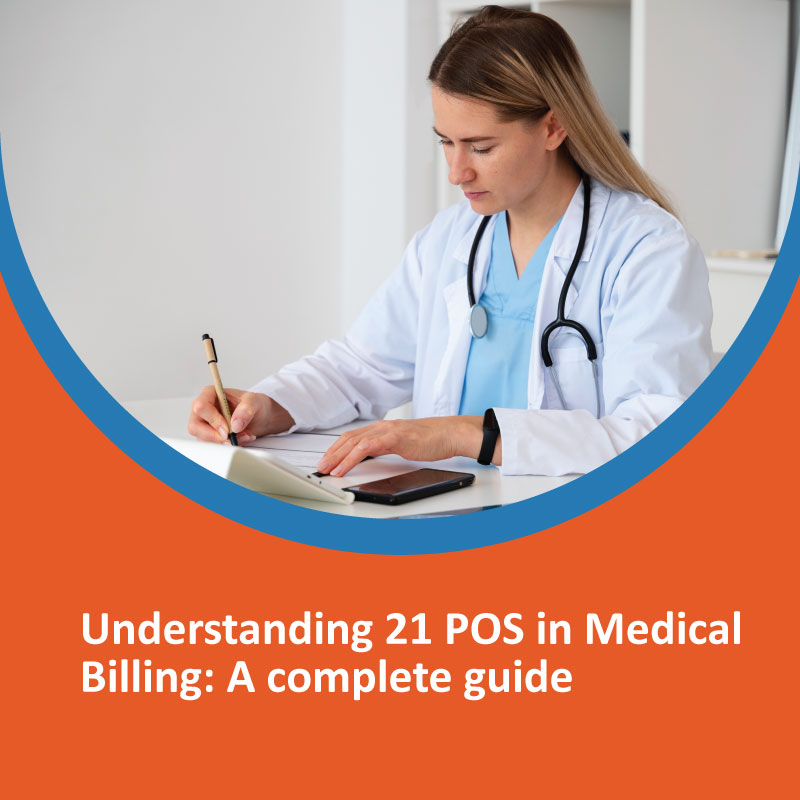There are a lot of codes and terms in medical Billing that may seem complicated to understand at first. Place of Service, or POS, is one of these terms. The POS code is a simple way for the insurance company to find out where the patient got their medical care. 21 POS is one of the most common codes for each location.
We will talk about 21 POS in medical Billing in this article. In this guide, we will explain what 21 POS means in medical Billing. You will learn when it should be used, why it’s essential, and how it affects payments and Billing rules. We will keep the information simple and easy to understand. This guide is helpful for medical billers, healthcare providers, and anyone who wants to understand their medical bills better.
What is the meaning of 21 POS in Medical Billing?
21 POS stands for Inpatient Hospital. When a patient is formally admitted to a hospital as an inpatient, this code is used. That implies the patient will stay in the hospital for at least one night, with a doctor in charge of their care, and get all the services the hospital offers.
The patient goes home the same day as outpatient care, which is different from this. POS 21 tells the insurance company: “This service happened in a hospital while the patient was admitted overnight or longer.”
Why Is 21 POS Important in Medical Billing?
To get the claim approved and paid correctly, you need to use the right POS code. Medicare, Medicaid, and private insurance companies all require medical practitioners to use the right POS codes.
If the wrong code is used, the claim may:
- Get denied
- Be underpaid
- Be flagged for audit.
- Cause payment delays
- Lead to compliance issues
Using POS 21 correctly ensures:
- Providers get paid the right amount
- Billing stays compliant with payer rules
- The Billing process runs smoothly.
When to Use 21 POS
You should use 21 POS only when the service is provided in a hospital inpatient setting. That means the patient must be:
- Formally admitted to the hospital
- Staying overnight or longer
- Receiving treatment during their inpatient stay
Common Mistakes with 21 POS
Here are a few errors to avoid when using POS 21 in Billing:
1. Using 21 POS for Outpatient Services
If a patient receives treatment in the hospital but is not admitted, use POS 22 instead.
2. Assuming Length of Stay = Inpatient
A patient might stay overnight for observation, but unless formally admitted, they are not considered inpatients.
3. Not Matching POS with CPT/HCPCS Codes
Some services are only payable in certain places of service. Make sure your procedure codes match with POS 21 when billing.
How 21 POS Affects Reimbursement
Insurance pays more for inpatient care than outpatient care. This is because inpatient care includes room, nursing, tests, and more. Outpatient care costs less as it covers fewer services.
But if you misuse 21 POS:
- You might bill at a higher rate than allowed
- The insurance payer may flag it as an error
- It may trigger audits or recoupments
Billing properly with POS 21 means the provider gets the correct amount, and the claim doesn’t face unnecessary issues.
POS 21 vs POS 22: What’s the Difference?
Let’s break down the key differences between these two common codes:
| POS Code | Name | Used When… |
| 21 | Inpatient Hospital | Patient is admitted and stays overnight or longer |
| 22 | Outpatient Hospital | Patient receives care and goes home the same day |
Always double-check the patient’s admission status before choosing the POS code.
Tips for Medical Billers
Here are some helpful tips if you work in Billing, coding, or medical administration:
- Check the Admission Orders: Before utilizing POS 21, be sure the patient has been officially admitted.
- Look at the paperwork: Make sure you know where and when the service will be.
- Keep Up to Date: The insurance rules can vary. Stay up to date with payer rules.
- Teach your staff: Teach doctors and nurses how crucial it is to write correct admission notes.
- Set up alerts in your software: A lot of Billing software can help you find POS codes that don’t match.
Conclusion:
Anyone who works in healthcare, Billing, coding, or administration needs to know about 21 POS. It is a small code that makes a big difference. Using it the right way helps you get paid on time and follow insurance rules.
You may avoid making costly errors and make sure patients get billed correctly by knowing when to utilize POS 21 and when not to.
Stay accurate. Stay informed. And always double-check your POS codes before submitting any claim.
FAQs
1. What does 21 POS stand for?
POS 21 stands for Inpatient Hospital. It means the patient stayed in the hospital and got care for at least one night.
2. Can I use 21 POS for a patient who stayed less than 24 hours?
Only if the patient was formally admitted as an inpatient, time alone doesn’t determine status; admission status is what counts.
3. What happens if I use 21 POS by mistake?
The claim may be denied, underpaid, or even flagged for audit. This can cause delays and reduce the chances of getting paid.
4. Does 21 POS affect how much we get paid?
Yes. Inpatient services (POS 21) frequently get paid more than outpatient care. But if you misuse it, you could get in trouble or have to pay it back.

